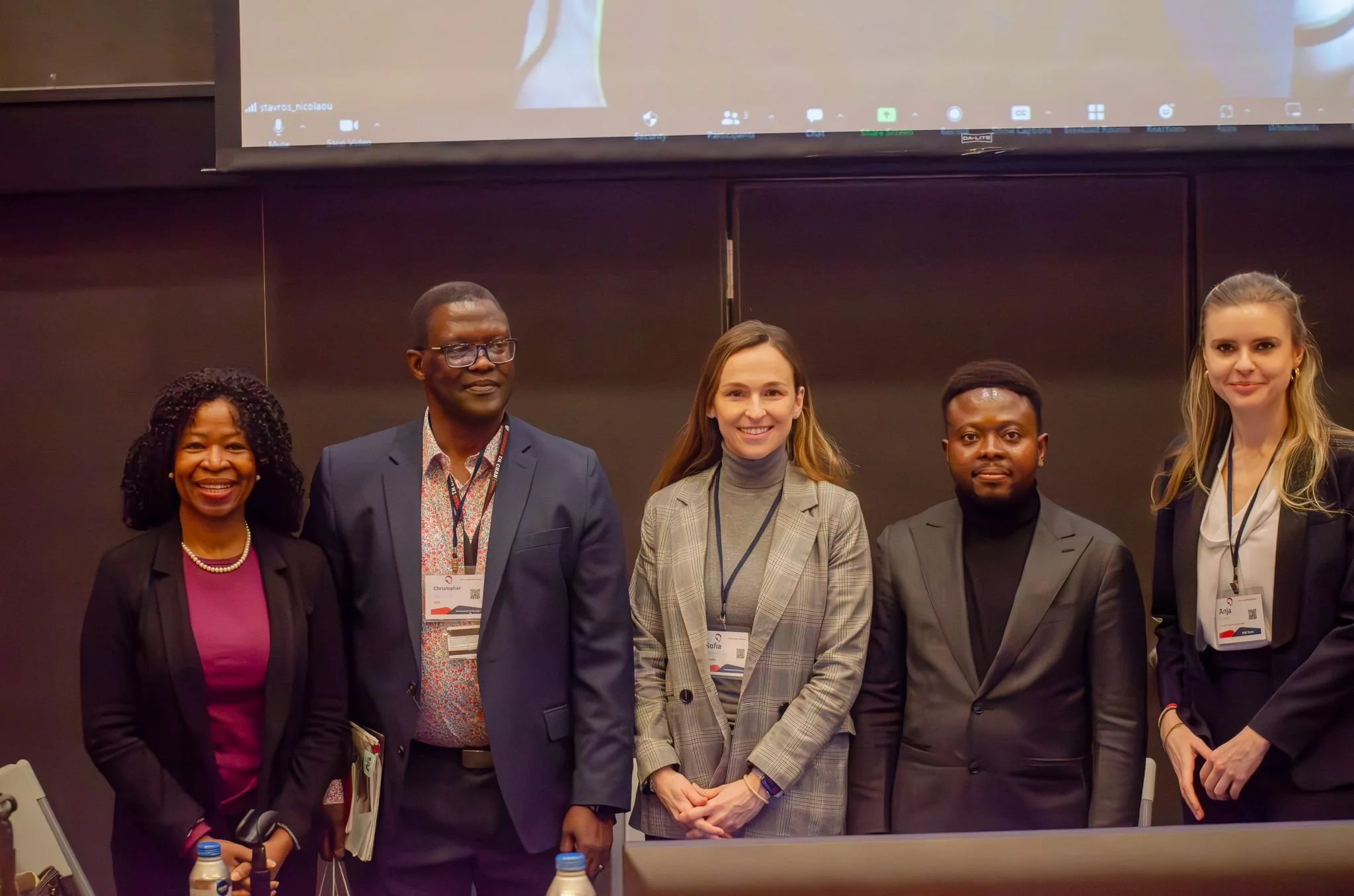Mapping Changemakers in Local Manufacturing in Africa
Speakers from the session. From left to right: Prof. Ruth, Dr. Christopher, Sofia, Adebayo and Anja the moderator of the panel. On the screen via Zoom is Dr. Stavros who is not pictured.
This post is in collaboration with the Harvard Chan Africa Health Students Forum.
The session on Drugs & Manufacturing: Strengthening Local Supply Chain Manufacturing at Harvard’s Second Annual Health Conference featured panelists from the Coalition for Epidemic Preparedness Innovations (CEPI), Harvard Law School Professor, AxmedRx, RxAll, and Aspen Pharmacare. This session was moderated by Anja Riester a Master of Public Student at Harvard’s School of Public Health.
Local manufacturing is a critical issue as drugs and vaccines exist but individuals cannot access them. Harvard Law Professor Ruth L. Okediji mentioned that we have accepted that there are medicines available and people die even though they exist. This is a similar comment I heard at AfrFursa’s Conference in Toronto where Dr. Menghis, the Chief Executive Officer of Bio Usawa, said it is an injustice when people die from illnesses when there is a known cure.
Dr. Christopher da Costa from, the Coalition for Epidemic Preparedness Innovations (CEPI) reminded us that the push for local manufacturing in Africa arose during the COVID-19 as there was a “scramble to supply vaccines” to the African continent. And even when vaccines were produced, there was no timely distribution of them and at times vaccine doses were disposed of as they expired. COVID-19 highlighted that local manufacturing is more than public health and health security, it is also about social justice. Social justice should be a key driver for public health decisions. Dr. Christopher also reminded us that health security is integral to having societies, and stable political systems.
The second speaker, was Dr. Stavros Nicolaou, from Aspen Pharmacare who emphasized the need for health equity on all continents as this is key for stability. Aspen Pharmacare, Africa’s largest pharmaceutical producer, has learned many lessons, especially from the HIV epidemic. These lessons include how to respond to pandemics such as producing generic drugs that are cheap and dealing with multi-drug resistant HIV. Africa has the capability and the capacity to produce health products and it is in everyone’s interest to develop this expertise.
An issue highlighted was the distribution of African-made pharmaceuticals which was also highlighted during the COVID-19 pandemic. African countries were provided with the rights to produce the COVID-19 vaccine but many European and North American companies wanted these African-made vaccines to be distributed within their countries. At a time when Africa has starkly lower vaccination rates compared to the rest of the world, that is inequitable. The intention was to produce vaccines using South African labor and not providing South Africans with any benefits. This sounds familiar historical occurrence and injustice where a people’s labor was used and they did not get any of the benefits.
The third speaker was Prof. Ruth L. Okediji who reminded us that this is not the continent’s first time trying to achieve self-sufficiency in local manufacturing. The first wave of local manufacturing interests was in the 1960’s, post-independence. There was the Decade of Development and in 1962, although the WHO aimed to help with national planning of systems to meet local health needs, there was little implementation. Post-independence there was a goal of developing self-sufficiency which included producing health products. This failed and thus the second wave was in the 1980’s during industrialization as a way to promote Africa’s development which also failed, and we are currently in the third wave. The COVID-19 pandemic helped to bolster investments in local manufacturing.
The fourth speaker was Sofia Radley-Searle from AxmedRX. Sofia discussed social enterprise issues in the pharmaceutical industry and how artificial intelligence (AI) can be used to combat market failures. Algorithms can aggregate demand and technology brings purchasing power back to the buyers. Sofia also mentioned how pharmaceutical companies are limited in distribution, and companies are only present in 20 countries in the world.
The final speaker was Adebayo ‘Ade’ Alonge, who founded RxAll after a 21-day coma following the use of a falsified drug. RxAll works in Nigeria, Kenya, and Uganda and aims to bring quality medications to Africans. The main goal of RxAll is to bring quality assurance tools from labs to the forefront of practice while also using resources within university environments. Adebayo also mentioned that health is a commodity and a business, but a different type of commodity as there is an inelastic demand for drugs. Recognizing this inelastic demand, suppliers should not be the only ones deciding the price of drugs.
In achieving local manufacturing, Aspen Pharmacare mentioned that procurement needs to be from African suppliers and sustainable, there needs to be harmonization across the regulatory platforms and regions in the world. There also needs to be a proficient way for technology transfer and Africa needs to have pooled procurement. The African Medicines Agency (AMA) and the African Union Development Agency (AUDA-NEPAD) are working towards making this a reality.
To conclude this session, Prof. Ruth suggested that moving forward we need to bring people together from public health, regulatory, legal, and business industries to events. This will help the collaboration to continue driving change in the health product manufacturing landscape.
